After the massive size of last year's report of all the books I read, I started a new project this year, where I give a monthly report. I think it's working out a little better, in that the eight or so friends who actually care what I'm reading can now consider it in smaller doses, but one of them complained this week that she still hadn't made it through my end of the year report from last year:
"It's like a wall of words. It goes on forever, and I get about halfway down and I just can't read anymore."
On the one hand, I get that. Writing that post was exhausting, and reading it probably also is. On the other hand, I kind of wonder how you're going to read a book if you can't make it through a blog entry, but hey, maybe I'm just being a bitch and responding poorly to criticism. That's also possible, and actually probably. With that in mind, though, I figured I might as well sum up the best of the 87 books I read. They're in no particular order, but I figure if they still stand out to me halfway through this year, then they probably actually were pretty good.
1) Peter Bracke's Crystal Lake Memories
I said this about it: Peter Bracke's "Crystal Lake Memories" really is the ultimate book for any fan of the "Friday the 13th" movies. Bracke spent over three years conducting over 200 interviews with producers, distributors, writers, directors, actors, stuntpeople, composers, costumers, makeup artists, and anyone else who worked on the film series, as well as reviewing studio documents and archives. What comes out of that is a fascinating oral history of the series combined with an almost overwhelming collection of images. There's at least one image on every page, but what really makes this book is the recollections and anecdotes from the people involved. While some of it is fascinating from a filmmaking perspective, delving into direction, casting, setting up special effects shots, challenging the ratings board, and funding, the stories of friendship, rivalry, backstabbing, endless takes, endless rewrites, drugs, sex, religion, and everything in between were compelling. I ended up rewatching almost all of the movies while reading this, and it really does make you see them in different ways. Also, that girl who played telekinetic Tina in part 7 is a real bitch. All of the other actors hated her, and she openly hates all of the other actors. Plus she's really, openly homophobic about her leading man.
This is clearly a labor of love for Bracke, because you don't spend years of your life interviewing people about movies that are most often considered trash unless you really, really love those movies. What I also liked about this, besides that it brought me greater enjoyment of the movies in question, is that it also serves as a tutorial on the moviemaking industry. By interviewing wardrobe, makeup, catering, extras, casting agents, producers, directors, writers, actors, audience members, special effects creators, electricians, set designers, cameramen, sound technicians, and everyone else involved in making the "Friday the 13th" movies, Bracke ends up giving a 360 degree education on the way a movie is made, and it's fascinating. Putting that education in the context of films that I already knew made it more interesting and easy to understand, and while this isn't the book for everyone it's definitely a good book for people who plan to work in the film and television industries.
2) John Hersey's Hiroshima
I said this about it: John Hersey's "Hiroshima" was a short, powerful read. While he could easily venture into sensationalism, Hersey sticks with matter of fact, direct accounts from survivors of the city, charting their journeys from minutes before the bomb was dropped to the decades after. Harrowing and often heartbreaking, the book conveys the horrors and consequences of war without being preachy.
I read this because one of my students was talking about reading it on Facebook, and I respect him, so I picked it up. This should be required reading for anyone who talks about war as a solution for the problems and threats facing our nation. I'm not saying we should never go to war, but we should be aware of what we are agreeing to do to other people, and understand that they actually are people who live, and hope, and suffer, and die because of decisions we make. They are human beings, just like we are, and we should think very hard about what we decided that it's necessary to do to them.
3) Laline Paull's The Bees
I said this about it: In Laline Paull's "The Bees", readers are thrust into a matriarchal dystopia where citizens are born to specific roles, deformity and disobedience lead to immediate death, and love of the queen trumps all other concerns. This tiny kingdom of women, where the few men are treated as princes whose only duty is to mate, is your local beehive. Flora 717, a lowly sanitation worker, is born in a time of crisis when the rains are heavy and the summer too short. The hive suffers under this crisis, but there are also hints of trouble within: deformities in the nursery, irregularities in the workers, rumors of illness in the hive, and then there's Flora herself, born with the power of speech and an inquisitive nature not found in her class. Exploring the hive, Flora is drawn deeper into the hidden secrets surrounding the queen even as she tries to protect her own secrets, leading to a confrontation that could destroy her and the hive together. This was a great read, full of detail and tension.
This was a fantastic piece of fiction. On the surface, it seems a little light and inconsequential, but it still sticks out in my head when I look at last year's list as, "Wow, that was a really good book." It was a debut novel from the author, and I look forward to more of her work.
4) Roxane Gay's Bad Feminist
I said this about it: Leonor sent me Roxane Gay's "Bad Feminist", and at first I wasn't really sure I would enjoy it. As a gay white male, a sort-of feminist essay collection by a sometimes-not-completely-hetero woman of color didn't really seem like something that I would really connect with, but I trust my friend's judgment and gave it a try, and I'm glad I did. Sometimes angry and blunt, sometimes funny, and at all times thoughtful and well-researched, I found that Gay and I had a lot more in common than I expected and felt, at times, that we were kindred spirits. We've both struggled with our weight. We've both worked at times in environments where we hear people saying derogatory things about minority groups that we happen to be part of. We've both fallen in love with seemingly perfect men who didn't love us back and were terrible for our self esteem. We also both have odd hobbies, both watch the same trashy television shows even though we know we should feel bad about it, and we both speak out about the things that bother us about our society. While I didn't agree with everything she said throughout the book, I did enjoy reading her thoughts and letting them spur my own introspection, and overall found the book engaging.
I didn't think I would connect with this book, but I found it relevant, resonant, and powerful.
5) Adrian Walker's The End of the World Running Club
I said this about it: My friend Jackie sent me Adrian Walker's "The End of the World Running Club", and it was a great book to read while I'm working on walking. It tells the story of Edgar Hill, an overweight 35 year old father of two living with his wife in a new house in Scotland. He drinks too much, he's not the best dad in the world, and he kind of hates his job, and on top of all of that the apocalypse arrives. The United Kingdom is devastated, and even though Ed and his family survive, he quickly loses them when a rescue chopper evacuates them while he's out foraging for food. His family has been taken to evacuation ships that are leaving in a month, and Ed has no choice but to follow if he's ever going to see them again. Falling in with a random collection of survivors, Ed and his companions must travel the length of a devastated Great Britain before the boats leave, while trying to find food, shelter, and fighting for survival against the remains of society. On top of all of that, Ed has to wage war with himself, with his poor fitness and health, with the mistakes of his past that continue to haunt him, and with maintaining the will and the drive to survive. I don't know if Adrian Walker is a distance runner, but he writes like one. As a person who is currently on my own quest for fitness, the entire book really resonated with me, including the realistic ending that everyone may not like. There are parts of this book that are really bleak (if you're a realist, then humanity behaves exactly the way you expect them to behave after a disaster), but overall it's very hopeful, and I enjoyed it.
I still think about this book while I'm out walking. Sometimes, when I'm tired, or halfway through my planned distance for a walk, quotes from it will surface in my mind and push me forward. It's possible that this book isn't as good as my brain thought it was, and maybe it just came along at the right time in my life when I needed to hear exactly this story, but I don't care. I liked it.
6) Kevin Roose's The Unlikely Disciple
I said this about it: Kevin Roose is a typical Brown University student: he parties, hooks up, drinks, hangs out in coffeeshops, has plenty of gay friends, and is a lifelong liberal from a family of liberals, which is why his family gets very, very worried about him when he decides that rather than go on a study abroad semester, he'll spend a semester undercover at Jerry Falwell's Liberty University instead. While enrolled at "Bible Boot Camp" he'll join a choir, go to nightly prayer meetings, attempt to save spring breakers, take classes that contradict everything he's been taught, and try to follow Liberty's strict 46 page code of conduct. Along the way, he finds both the expected and the unexpected, and does his best to bridge the "God Gap" between himself and the Christian classmates who surround him. "The Unlikely Disciple" was a really good read, at times touching, funny, thought provoking, and even infuriating.
I don't read a lot of books about religion, but it's sometimes a topic that I struggle with personally. I was so intrigued and moved by this book, which I bought at a church book sale, that I immediately ordered a copy for a friend. I haven't seen my own copy in months, because I let someone borrow it and they asked if they could let someone else borrow it, and off it went. The last update I got while walking across campus was a friend in the Haslam College of Business who said, "Hey! I have your book!" I know it has passed through at least three sets of hands already, and I may never see it again, but that's ok. I think people should read this book. I even recommended it as the "Life of the Mind" book that all freshmen read, but it didn't get picked. I may recommend it again next year.
I'm kind of surprised that this list isn't longer, but as I read through last year's list, there are a lot of books that I look at and think, "Yeah, that was pretty good, but..."
These six are the books that didn't have a "but" after them, so they must be the best.
Sunday, June 21, 2015
Thursday, June 11, 2015
Blair Witch Jell-O
When I still lived on Dutch Quad, I ate at the quad dining hall fairly often. We were given a certain number of meals for the week, but if I went down for lunch the lady working usually waved me through without swiping, which meant I could get lunch for free and save my prepaid meals for dinner a few nights a week. Dining hall food is dining hall food: sometimes it's surprisingly good, and there are some recipes that the staff did particularly well.
There were some nights, though, when the cafeteria served what the RA's and I referred to as "Blair Witch Dinner".
If it's been a while since you saw The Blair Witch Project, let me explain: the last third of the movie pretty much consists of the two surviving protagonists running through the woods before jerking to a stop and screaming, "WHAT THE FUCK IS THAT?" in terror while sobbing and pointing. That's pretty much what happened on the nights that the cafeteria served Blair Witch Dinner, too. You'd be dragging your tray down the serving line, talking to whoever you came down with, passing the chicken, passing some potatoes, passing the vegetarian entrée, and then JESUS CHRIST, WHAT IS THAT? WHAT IS IT? OH, GOD, OH, GOD, OH, GOD!
Sheer terror, in the form of food.
Nothing they ever served us at the Dutch Quad Cafeteria, though, ever reached the terror of last week's Antipasto Salad.
I have touched the soul of horror, and it is made of Jell-O.
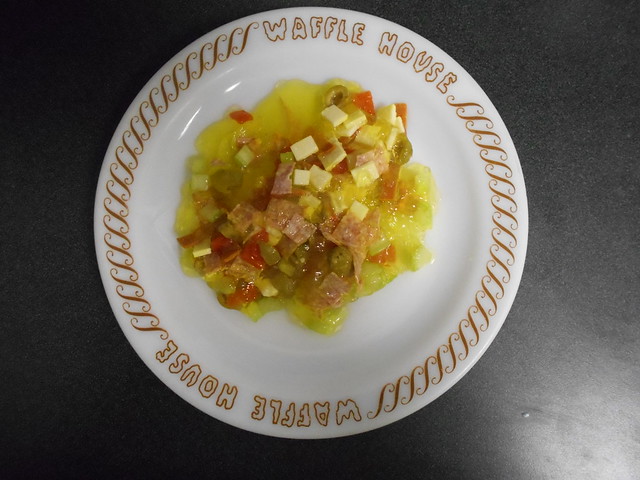
This all started when I bought that Jell-O cookbook and decided to cook from it. I opened Pandora's Jell-O Box, and visited sorrow upon my kitchen. After successfully completing the Topaz Parfait super-dessert, I decided to try something more challenging, more daring, not stopping to think about how much more intense things could get when I wanted to eat something more challenging, taste-wise, than a dessert made from artificially flavored lemon gelatin and coffee.
I decided to try the Barbecue Salad.
I was initially pretty suspicious of this recipe. After all, it called for canned tomato sauce, vinegar, salt, pepper, and orange gelatin. One of those things is not like the others, a Jet among Sharks, but I assembled my ingredients and a stack of 7 ounce Pyrex 407s, which seemed the perfect size for individual servings of Barbecue Salad:
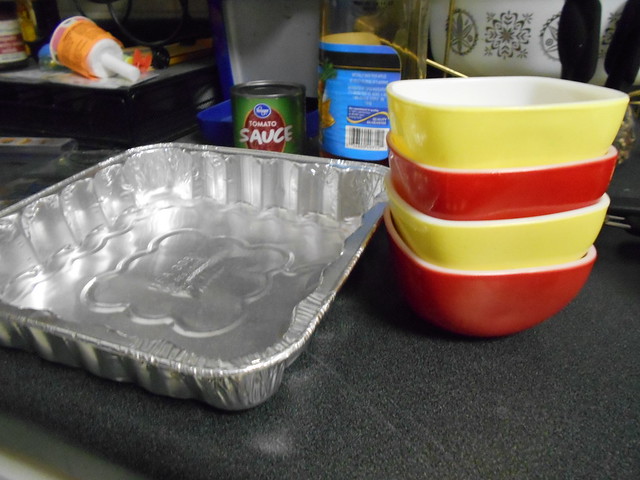
The recipe said it would make three cups, but I opted to use the fourth 407 to stabilize the other three, so that I could move them in and out of the refrigerator to set without them sliding around and spilling. I set about mixing the ingredients:
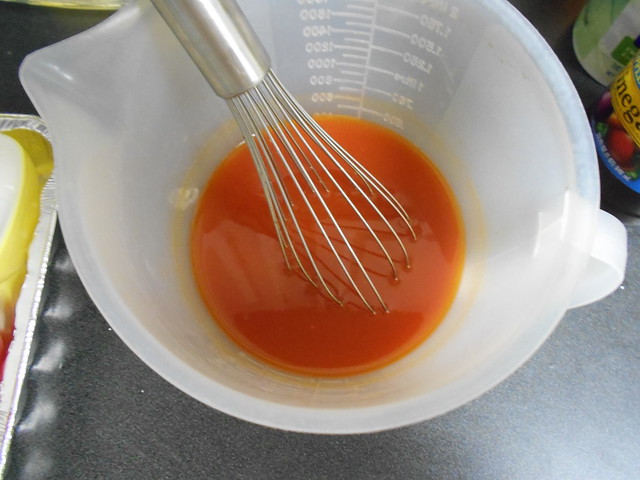
(I really need a 2-4 cup glass measuring cup if I'm going to keep doing things to Jell-O, because the boiling water is melting that plastic one a little more each time) and poured them into the 407s to set overnight in the fridge, after which they looked about like you expect tomato Jell-O to look:
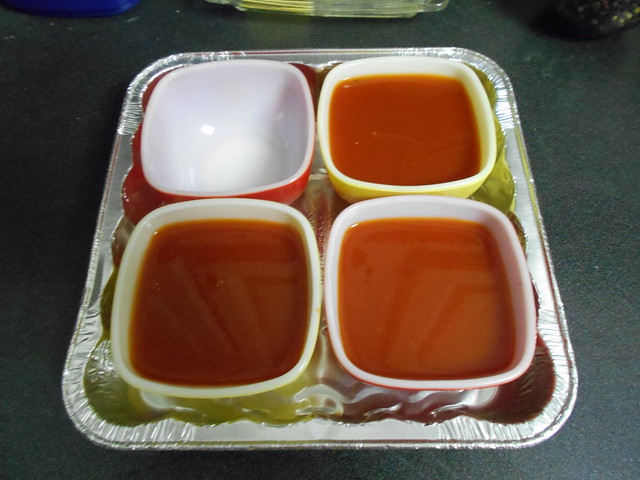
I dipped one of the bowls in a larger bowl of hot water until the Jell-O released from the bowl, and unmolded it onto a Pyrex Ebony plate of spring mix salad greens:
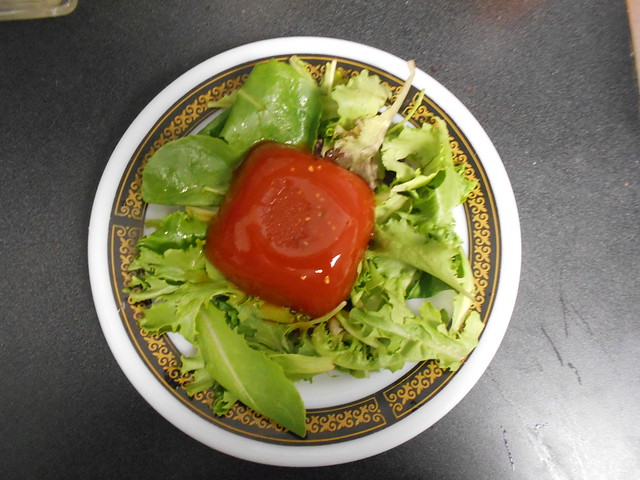
And then I ate it. After a little bit of experimentation, I figured out that the best way to do it was to slice a chunk of the Barbecue Salad off with the fork, spear a few leaves, and then eat the whole forkful at once. Believe it or not, it really wasn't that bad. It was like a really savory salad dressing, and didn't taste like sweet orange Jell-O at all. The combination of vinegar and tomato sauce was really acidic, but on the second night I topped the salad with a dollop of mayonnaise like the cookbook suggested:
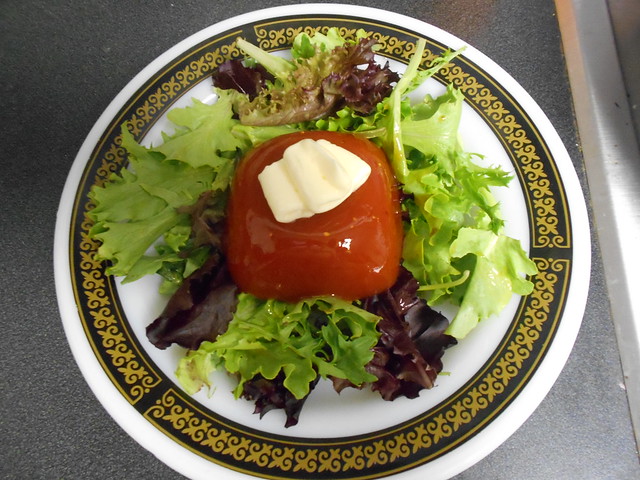
and it really wasn't bad. In fact, after I let it sit for a few minutes so that the Barbecue Salad could lose some of its chill and warm up a little, I was almost completely over the weird texture. I would actually eat this again, despite how disturbing the recipe sounded. Maybe I was wrong about the other recipes, too. Maybe the pictures weren't really as scary as they looked. Maybe I should try another salad, and see if I was again pleasantly surprised.
Maybe I should have quit while I was ahead.
I didn't, though. I pressed onward, turning pages and thinking until I arrived at the Antipasto Salad.
That's where this all goes to hell.
The Antipasto Salad consists of a lot of things you would put in an antipasto (olives, salami, pepperoni, Swiss cheese, celery, and onions, which I omitted), suspended in a mixture of lemon Jell-O, vinegar, and salt. Eager to try, ready to challenge myself in the kitchen and explore new things, I got to dicing:
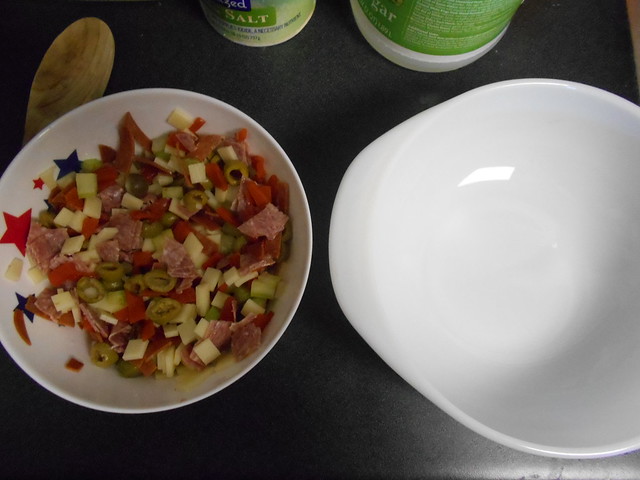
and then got to mixing the other ingredients in a Pyrex Opal 023. Unlike the last recipe, this one actually called for a little bit of technique: after mixing the boiling water, salt, gelatin, and vinegar, I had to add in ice cubes and stir for three to five minutes until the mixture partially thickened.
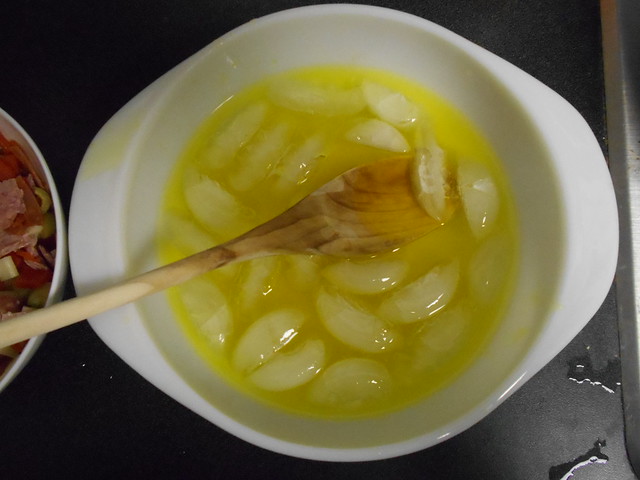
The reason for doing so is that when you add things to the gelatin, you want them suspended in it. Otherwise, they'll just sink to the bottom. After four minutes it was visibly thicker, so I scooped out the remaining ice cubes as instructed, added my ingredients, put the lid on, and put the whole thing in the refrigerator overnight to set. When I finished, it looked about how you would expect a bowl of Jell-O with hunks of cheese, meat, and vegetables in it to look:
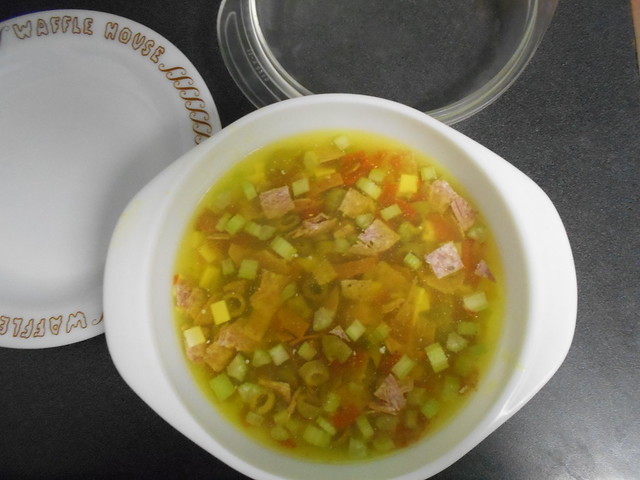
Perfect, right? I scooped a heaping spoonful onto my only Pyrex Waffle House plate:

and that's when things turned bad. The flavor wasn't terrible, and I tried to explain this to my friends. It tasted like a heavily dressed antipasto. The texture, though, is a bridge too far. Do you like chewing cold celery and chunks of cold cheese and cold salami after sucking a mouthful of thick, slimy liquid off of them? If so, this is the dish for you. It's not the dish for me. Right now, it's sitting in the refrigerator missing only that first spoonful.
When I went back to the refrigerator on the second night fully intending to try it again I thought about the chewing, the texture, having that in my mouth and having to chew it and feeling it slide around my teeth and my stomach gave an actual, physical lurch, so hard that I had to grab my kitchen counter.
My body physically recoiled from the memory of the Antipasto Salad.
I grabbed my book, left my apartment, and walked to a nearby restaurant for dinner. I did that again the next night. Since then, I've just pretended that it's not sitting in there, waiting, gelled and ready on the bottom shelf. It's going to be there forever, you know. It's not like it will go bad. The food is sealed in lemon gelatin like flies in amber, but the memory in my head is still squirming and alive.
I tried to put it all behind me, and moved back to one of the dessert chapters. I'd had success with dessert. Dessert is my friend. Dessert would never hurt me like salad would.
Dessert betrayed me, too.
I decided to make the Peach Gem Pie, which is basically Jell-O with peaches in a pie crust. I unrolled a premade pie crust into a Pyrex Visionware pie plate, lined it with parchment paper, and filled it with uncooked rice:
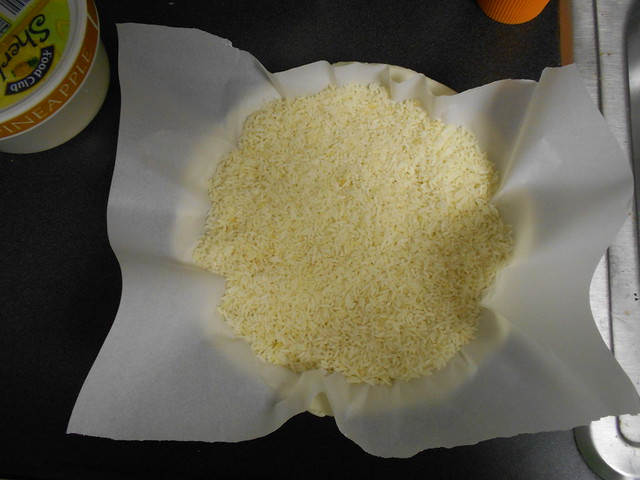
Leaving the rice in there while it bakes keeps the shape of the crust, and the parchment paper keeps it from sticking to the crust as it bakes. I forgot to use it once when I was making a quiche crust and had to pick a whole bunch of uncooked rice out of the bottom of the crust before I could pour in my quiche filling, and since then I've never forgotten again. Once the crust was done I mixed up the gelatin, stirred in some ice until it thickened quite a bit, added the peaches, and let it set. It looks about like you think a pie filled with Jell-O should look:
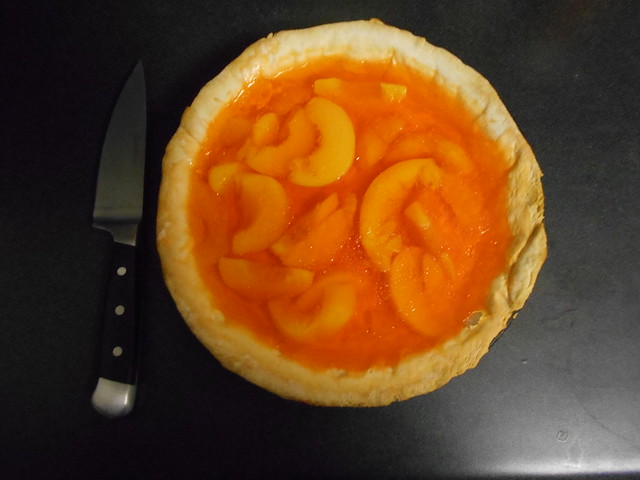
The problem is that the Jell-O made the pie crust soggy. Really soggy. Mushy and soggy. The slice started losing its shape as soon as I plated it on Pyrex Tiburon:
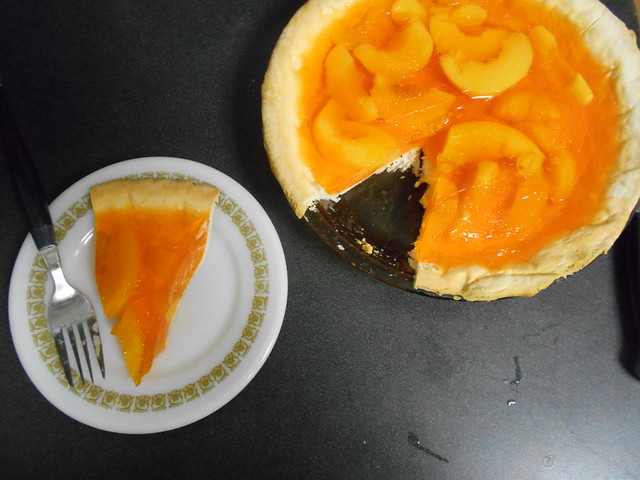
but I ate it anyway.
I've peeled the crust off of every piece since then, and just eaten it as a bowl of Jell-O with peaches.
There were some nights, though, when the cafeteria served what the RA's and I referred to as "Blair Witch Dinner".
If it's been a while since you saw The Blair Witch Project, let me explain: the last third of the movie pretty much consists of the two surviving protagonists running through the woods before jerking to a stop and screaming, "WHAT THE FUCK IS THAT?" in terror while sobbing and pointing. That's pretty much what happened on the nights that the cafeteria served Blair Witch Dinner, too. You'd be dragging your tray down the serving line, talking to whoever you came down with, passing the chicken, passing some potatoes, passing the vegetarian entrée, and then JESUS CHRIST, WHAT IS THAT? WHAT IS IT? OH, GOD, OH, GOD, OH, GOD!
Sheer terror, in the form of food.
Nothing they ever served us at the Dutch Quad Cafeteria, though, ever reached the terror of last week's Antipasto Salad.
I have touched the soul of horror, and it is made of Jell-O.

This all started when I bought that Jell-O cookbook and decided to cook from it. I opened Pandora's Jell-O Box, and visited sorrow upon my kitchen. After successfully completing the Topaz Parfait super-dessert, I decided to try something more challenging, more daring, not stopping to think about how much more intense things could get when I wanted to eat something more challenging, taste-wise, than a dessert made from artificially flavored lemon gelatin and coffee.
I decided to try the Barbecue Salad.
I was initially pretty suspicious of this recipe. After all, it called for canned tomato sauce, vinegar, salt, pepper, and orange gelatin. One of those things is not like the others, a Jet among Sharks, but I assembled my ingredients and a stack of 7 ounce Pyrex 407s, which seemed the perfect size for individual servings of Barbecue Salad:

The recipe said it would make three cups, but I opted to use the fourth 407 to stabilize the other three, so that I could move them in and out of the refrigerator to set without them sliding around and spilling. I set about mixing the ingredients:

(I really need a 2-4 cup glass measuring cup if I'm going to keep doing things to Jell-O, because the boiling water is melting that plastic one a little more each time) and poured them into the 407s to set overnight in the fridge, after which they looked about like you expect tomato Jell-O to look:

I dipped one of the bowls in a larger bowl of hot water until the Jell-O released from the bowl, and unmolded it onto a Pyrex Ebony plate of spring mix salad greens:

And then I ate it. After a little bit of experimentation, I figured out that the best way to do it was to slice a chunk of the Barbecue Salad off with the fork, spear a few leaves, and then eat the whole forkful at once. Believe it or not, it really wasn't that bad. It was like a really savory salad dressing, and didn't taste like sweet orange Jell-O at all. The combination of vinegar and tomato sauce was really acidic, but on the second night I topped the salad with a dollop of mayonnaise like the cookbook suggested:

and it really wasn't bad. In fact, after I let it sit for a few minutes so that the Barbecue Salad could lose some of its chill and warm up a little, I was almost completely over the weird texture. I would actually eat this again, despite how disturbing the recipe sounded. Maybe I was wrong about the other recipes, too. Maybe the pictures weren't really as scary as they looked. Maybe I should try another salad, and see if I was again pleasantly surprised.
Maybe I should have quit while I was ahead.
I didn't, though. I pressed onward, turning pages and thinking until I arrived at the Antipasto Salad.
That's where this all goes to hell.
The Antipasto Salad consists of a lot of things you would put in an antipasto (olives, salami, pepperoni, Swiss cheese, celery, and onions, which I omitted), suspended in a mixture of lemon Jell-O, vinegar, and salt. Eager to try, ready to challenge myself in the kitchen and explore new things, I got to dicing:

and then got to mixing the other ingredients in a Pyrex Opal 023. Unlike the last recipe, this one actually called for a little bit of technique: after mixing the boiling water, salt, gelatin, and vinegar, I had to add in ice cubes and stir for three to five minutes until the mixture partially thickened.

The reason for doing so is that when you add things to the gelatin, you want them suspended in it. Otherwise, they'll just sink to the bottom. After four minutes it was visibly thicker, so I scooped out the remaining ice cubes as instructed, added my ingredients, put the lid on, and put the whole thing in the refrigerator overnight to set. When I finished, it looked about how you would expect a bowl of Jell-O with hunks of cheese, meat, and vegetables in it to look:

Perfect, right? I scooped a heaping spoonful onto my only Pyrex Waffle House plate:

and that's when things turned bad. The flavor wasn't terrible, and I tried to explain this to my friends. It tasted like a heavily dressed antipasto. The texture, though, is a bridge too far. Do you like chewing cold celery and chunks of cold cheese and cold salami after sucking a mouthful of thick, slimy liquid off of them? If so, this is the dish for you. It's not the dish for me. Right now, it's sitting in the refrigerator missing only that first spoonful.
When I went back to the refrigerator on the second night fully intending to try it again I thought about the chewing, the texture, having that in my mouth and having to chew it and feeling it slide around my teeth and my stomach gave an actual, physical lurch, so hard that I had to grab my kitchen counter.
My body physically recoiled from the memory of the Antipasto Salad.
I grabbed my book, left my apartment, and walked to a nearby restaurant for dinner. I did that again the next night. Since then, I've just pretended that it's not sitting in there, waiting, gelled and ready on the bottom shelf. It's going to be there forever, you know. It's not like it will go bad. The food is sealed in lemon gelatin like flies in amber, but the memory in my head is still squirming and alive.
I tried to put it all behind me, and moved back to one of the dessert chapters. I'd had success with dessert. Dessert is my friend. Dessert would never hurt me like salad would.
Dessert betrayed me, too.
I decided to make the Peach Gem Pie, which is basically Jell-O with peaches in a pie crust. I unrolled a premade pie crust into a Pyrex Visionware pie plate, lined it with parchment paper, and filled it with uncooked rice:

Leaving the rice in there while it bakes keeps the shape of the crust, and the parchment paper keeps it from sticking to the crust as it bakes. I forgot to use it once when I was making a quiche crust and had to pick a whole bunch of uncooked rice out of the bottom of the crust before I could pour in my quiche filling, and since then I've never forgotten again. Once the crust was done I mixed up the gelatin, stirred in some ice until it thickened quite a bit, added the peaches, and let it set. It looks about like you think a pie filled with Jell-O should look:

The problem is that the Jell-O made the pie crust soggy. Really soggy. Mushy and soggy. The slice started losing its shape as soon as I plated it on Pyrex Tiburon:

but I ate it anyway.
I've peeled the crust off of every piece since then, and just eaten it as a bowl of Jell-O with peaches.
Wednesday, June 3, 2015
Eleven Months
It has now been eleven months since I decided to change my life and lose weight, and last month kind of ended on a cliffhanger. After the depressing month when I didn't lose any weight something worse happened, and in the tenth month I gained ten pounds and then swore to lose them again. I vowed to get back on the horse, not let it be a permanent setback, and to stay the course.
And I lost five pounds.
I now weigh 225 pounds.
I'm not celebrating, but I will acknowledge my achievement. I returned to my routine, stayed mostly on diet, made my step goals, and lost five pounds, but I'm not really in the mood to congratulate myself because I lost those five pounds already. I'm still mad at myself for spending a month making poor choices and then justifying and rationalizing those poor choices. It's not like I didn't know that I could put weight back on, as there are obvious, logical reasons why I weighed 295 pounds in the first place.
I'm not mad that I backslid. I'm disappointed in myself, yes, but what I'm mad about is the wasted effort. I spent the month losing five pounds that I already lost to get back to where I was two months ago. If I can lose five more pounds this month, then I will be back to where I was in February, but I could have spent those two months moving forward instead. I could have been two months closer to being overweight instead of obese. I could have been two months closer to Venice, but instead I will spend four months making the same progress, and that depresses and disappoints me. I made bad choices, and I have to accept responsibility for them and deal with the fallout, but I'm not happy about it. I'm not happy that I lost five pounds, because I shouldn't have gained ten pounds to begin with.
I cheated myself out of two months of progress.
But hey, I lost five pounds.
I also lost my treadmill.
Yes, in addition to the shoes I've worn down, the shoes I bought to replace them (which I am also about to replace), and dozens of outfits, I've now managed to outwalk my treadmill, too. I guess if one of us was going to break, I'm glad it was the treadmill rather than, you know, me.
I had a feeling this was coming, honestly. A couple of months ago I was finishing up a walk on the treadmill and when I got off I noticed a little plastic wheel on the floor next to the treadmill.
Oh, I thought, picking it up. That's not good.
I didn't see any obvious places that the little wheel fell out of, though, and the treadmill seemed to work fine without it, so I put it out of my mind and continued my routine. Then, a few weeks later, I noticed another little plastic wheel next to the treadmill, but on the other side. Again, the treadmill continued working, so I tried not to worry about it. I did examine it much more closely, and figured out that the little wheels helped the treadmill raise and lower the deck if you want to change the incline. Fortunately, I never walk on an incline, so the loss of the little wheels didn't seem that important. They were a warning, though, a sign that my aging treadmill might not be up to almost a year of steady usage. I chose to ignore the signs, and then the treadmill died.
The other night I turned it on and started walking, or, rather, tried to start walking. As soon as I stepped on the deck, the belt stopped turning. At first I thought, "It's broken. Better throw it away," but then I thought, "Wait... maybe I can fix it." I started consulting the internet, and was offered a range of possible solutions.
Did I need to tighten the belt? No, belt was fine.
Did I need to lubricate the belt? No, that seemed fine, too.
Was the other belt inside the casing that turns the bigger belt that I walk on broken? No, that was fine, too.
My treadmill's engine has given out. It no longer has the power to turn the little belt or the big belt, which probably explains why the treadmill has seemed slower than it says it's moving lately and why it sometimes made a random grinding noise.
The treadmill is dead, and I will have to figure out a day when I have time to move it out to the porch and then have friends come over for a minute to help me get it down the steps and into the dumpster. I'm sure my friends will line up and volunteer for this, because my friends are kind, generous, giving people, the kind of people who might have some upper body strength and might be willing to use it to help send my poor, suffering treadmill off to a farm in the country where it has room to run around and frolic in the sun and has lots of other treadmills to play with. My treadmill is going to a better place, everybody.
I, on the other hand, have been going to the fitness center in my apartment complex.
This situation is not ideal, but it is workable. I don't like the place where my Kindle fits on the fitness center treadmills, because it doesn't cover up the clock and I have to force myself not to look at the terribly slow moving numbers. More importantly, I don't know how I feel about interacting with my neighbors. I'm not used to talking to them, or being in close proximity to them, or wondering if I've been on the treadmill for too long and am supposed to share it with one of them. I don't know these unspoken rules to using a fitness facility, like if you have to bring a towel or if people will tell you when they want to use the machine you're on and if you're supposed to make small talk and who gets to be in charge of the television and what channel it's on.
I guess I'm going to learn them.
Or I'm going to last about a month, and then buy a new treadmill.
And I lost five pounds.
I now weigh 225 pounds.
I'm not celebrating, but I will acknowledge my achievement. I returned to my routine, stayed mostly on diet, made my step goals, and lost five pounds, but I'm not really in the mood to congratulate myself because I lost those five pounds already. I'm still mad at myself for spending a month making poor choices and then justifying and rationalizing those poor choices. It's not like I didn't know that I could put weight back on, as there are obvious, logical reasons why I weighed 295 pounds in the first place.
I'm not mad that I backslid. I'm disappointed in myself, yes, but what I'm mad about is the wasted effort. I spent the month losing five pounds that I already lost to get back to where I was two months ago. If I can lose five more pounds this month, then I will be back to where I was in February, but I could have spent those two months moving forward instead. I could have been two months closer to being overweight instead of obese. I could have been two months closer to Venice, but instead I will spend four months making the same progress, and that depresses and disappoints me. I made bad choices, and I have to accept responsibility for them and deal with the fallout, but I'm not happy about it. I'm not happy that I lost five pounds, because I shouldn't have gained ten pounds to begin with.
I cheated myself out of two months of progress.
But hey, I lost five pounds.
I also lost my treadmill.
Yes, in addition to the shoes I've worn down, the shoes I bought to replace them (which I am also about to replace), and dozens of outfits, I've now managed to outwalk my treadmill, too. I guess if one of us was going to break, I'm glad it was the treadmill rather than, you know, me.
I had a feeling this was coming, honestly. A couple of months ago I was finishing up a walk on the treadmill and when I got off I noticed a little plastic wheel on the floor next to the treadmill.
Oh, I thought, picking it up. That's not good.
I didn't see any obvious places that the little wheel fell out of, though, and the treadmill seemed to work fine without it, so I put it out of my mind and continued my routine. Then, a few weeks later, I noticed another little plastic wheel next to the treadmill, but on the other side. Again, the treadmill continued working, so I tried not to worry about it. I did examine it much more closely, and figured out that the little wheels helped the treadmill raise and lower the deck if you want to change the incline. Fortunately, I never walk on an incline, so the loss of the little wheels didn't seem that important. They were a warning, though, a sign that my aging treadmill might not be up to almost a year of steady usage. I chose to ignore the signs, and then the treadmill died.
The other night I turned it on and started walking, or, rather, tried to start walking. As soon as I stepped on the deck, the belt stopped turning. At first I thought, "It's broken. Better throw it away," but then I thought, "Wait... maybe I can fix it." I started consulting the internet, and was offered a range of possible solutions.
Did I need to tighten the belt? No, belt was fine.
Did I need to lubricate the belt? No, that seemed fine, too.
Was the other belt inside the casing that turns the bigger belt that I walk on broken? No, that was fine, too.
My treadmill's engine has given out. It no longer has the power to turn the little belt or the big belt, which probably explains why the treadmill has seemed slower than it says it's moving lately and why it sometimes made a random grinding noise.
The treadmill is dead, and I will have to figure out a day when I have time to move it out to the porch and then have friends come over for a minute to help me get it down the steps and into the dumpster. I'm sure my friends will line up and volunteer for this, because my friends are kind, generous, giving people, the kind of people who might have some upper body strength and might be willing to use it to help send my poor, suffering treadmill off to a farm in the country where it has room to run around and frolic in the sun and has lots of other treadmills to play with. My treadmill is going to a better place, everybody.
I, on the other hand, have been going to the fitness center in my apartment complex.
This situation is not ideal, but it is workable. I don't like the place where my Kindle fits on the fitness center treadmills, because it doesn't cover up the clock and I have to force myself not to look at the terribly slow moving numbers. More importantly, I don't know how I feel about interacting with my neighbors. I'm not used to talking to them, or being in close proximity to them, or wondering if I've been on the treadmill for too long and am supposed to share it with one of them. I don't know these unspoken rules to using a fitness facility, like if you have to bring a towel or if people will tell you when they want to use the machine you're on and if you're supposed to make small talk and who gets to be in charge of the television and what channel it's on.
I guess I'm going to learn them.
Or I'm going to last about a month, and then buy a new treadmill.
Subscribe to:
Posts (Atom)